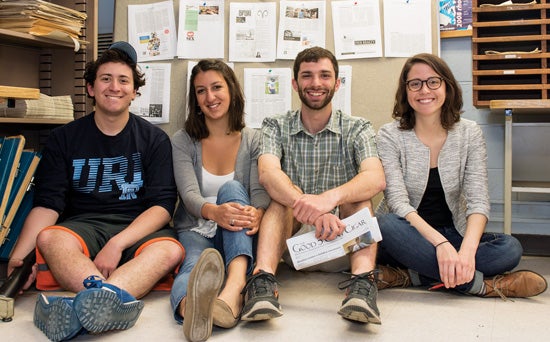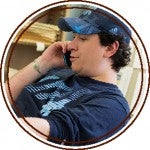A Tradition, Rewritten

By Paul E. Kandarian
Think print is dead? Take a look around Kingston, where 19-year-old students are as likely as their professors to be seen poring over the pages of the student newspaper, the Good 5 Cent Cigar. The paper’s dynamic stable of reporters displays all the hunger, urgency, and compulsion to find the truth that has always driven the best journalism—and the future is theirs to write.

Carla Aveledo ’15 worked in Newport for the summer after graduating, and is applying for reporter positions at newspapers. “The future of journalism, I think, lies in multimedia,” she says. “People like watching videos and photos and listening to audio packages. The news will always have to be digested, it’s just the format that is changing, and I don’t think there is anything wrong with that.”
A few years back, URI’s student newspaper, the Good 5 Cent Cigar, which was founded in 1971 and has waxed and waned ever since, was a flimsy four-page periodical filled with canned copy and little University news. Few would have disputed that its star was waning, and the stacks of free papers distributed around campus went virtually untouched.
“I would pick it up and it didn’t draw me,” recalls Carla Aveledo ’15, managing editor of the Cigar for the past two years. In fact, she says, its presence was so ineffectual that “it was hardly even there.”
That’s changed. During the past two years, thanks to a devoted staff and news-oriented leadership, the Cigar has morphed. It used to come out four times a week; now, it comes out once, but that one issue offers 16 pages. More importantly, it’s once more required reading, full of the kind of news that its campus readership can use. The proof: the stacks disappear in short order the day they’re put out.
It’s all the encouragement, Aveledo says, that she and her staff ever wanted. But it’s not all they’ve won: This year, the Cigar broke the campus news barrier, garnering attention from the Providence Journal, which credited it with breaking a story on questionable towing practices at the Kingston Emporium. Jim Romenesko, a national news blogger with an enormous following, mentioned the story on his morning list. A reported controversy about a staffer’s dog ordered from campus made BuzzFeed and was re-tweeted by sports commentator Keith Olbermann.

Allison Farrelly ’16 says she is grateful that “I have another year of college to figure things out.” She craves adventure and an active life, and is drawn toward narrative storytelling and travel journalism. “The exciting thing about entering journalism now is no one knows what the future holds, so I think to some extent the playing field is more level than in other professions. There will always be a need for people who can read, write, communicate, and synthesize information.”
What happened? “There was a lot of new blood on the paper,” Aveledo explains. “I think we were all really motivated to make it something substantial. We didn’t want to work for a paper that wasn’t being read.” That meant a shift away from “just coverage of events,” she says, and toward “real news.”
One of the biggest driving forces behind the changes, Aveledo and others say, was the leadership of Allison Farrelly ’16, the paper’s editor in chief.
“Hard work and luck,” Farrelly insists, when asked what turned the paper around. “We worked,” she adds. “I can’t stress that enough, the work we put into it—late nights, meetings over the summer, meltdowns around the newsroom table. But we got lucky because everyone involved wanted to make a huge difference.”
Farrelly, a Jamestown, R.I. native who came aboard as a freshman, held various positions over the years before being voted in as editor in chief. With experience from her North Kingstown High School newspaper, she already knew she wanted to major in journalism; but she’s been surprised by just how rewarding an experience the Cigar has been. “In recent years, it’s been one of the most underutilized tools for journalism majors,” she says. She’s helped transform it into a launching pad: her work there, and for her professors, helped her win a newsroom internship at Rhode Island Public Radio this summer; she also won an R.I. Press Association scholarship to study international journalism in the Czech Republic in July. “But,” she maintains, “the best thing about it has been the relationships we’ve formed.”
The core team includes Ryan Wichelns ’15, who graduates this December, and sports editor Jacob Marrocco ’16.

Ryan Wichelns ’15 doesn’t see himself as a newsroom journalist, preferring the idea of writing about the outdoors, such as hiking and climbing stories for magazines. “Not that I didn’t love everything I did this year,” he says. “But I’m not sure I can see doing it full time for a long time.”
“Allie roped me into it spring of last year,” says Wichelns, who is also a journalism major. “I wish I’d done it sooner. I tell everyone this was the best thing I could have done for my journalism skills. It really opened me up to a lot more.”
A native New Yorker, Wichelns did not have experience working at his high school newspaper. He says his writing then was mostly confined to “rhetorical analyses of 100-year-old novels. I didn’t enjoy that.” But his interest was caught when he took advanced placement English in his senior year.
“My first big story came from a tip we got about a new hiring plan URI was working on,” he recalls of his career at the Cigar. “We got in touch with some people, interviewed the provost and the president, and broke the story. We got credit from the Providence Journal on that one.”
Wichelns did actually read the Cigar his first couple years at URI. “It’s incredible to see how much it’s changed since then,” he says. “The biggest thing is hearing from faculty and staff and students who say ‘Wow, the Cigar’s really stepped it up.’”
Also from Rhode Island, sportswriter Marrocco freelanced for the Warwick Beacon when he attended Pilgrim High School, finding a love of journalism but, he says, not the skills he’d need to make a career of it. “I couldn’t write—I was really bad,” he says. “But the Cigar shaped me. The classes helped of course, but all of the repetition from working at the Cigar hammered in the basics. The majority of my growth I owe to the Cigar.”

Jacob Marrocco ’16 says he’d like to be a sports journalist “anywhere but on TV. I did a couple radio shows at URI, and liked it.” He adds, laughing, “I think I have the perfect face for radio.” Jokes aside, Marrocco’s serious about his career—and landed a summer sports-writing gig back where he started, at the Warwick Beacon.
Marrocco is proud of the paper’s evolution. “It’s been part of URI for 40-plus years, and it was sad to see the state it was in,” he remembers. “It sucks that the work I did as a freshman was for naught because it was so bad.” He credits Farrelly with “sorting it all out. Actually, I ran against her for editor in chief, but halfway through this year I told her, ‘I’m happy you beat me.’”
He has written about virtually every sport at URI. It’s a personal mission for someone born with hemophilia. “I couldn’t play contact sports,” he says. “The next best thing is writing about them.” And no matter what the future holds for him, he says, “I owe everything I am, and everything I will be, to the Cigar.”
The newsroom offices are decidedly old school, with 1970s-style desks and raggedy furniture. Bookshelves hold a variety of works, including one on the history of media in America. On a chair is heaped a well-used New England Patriots blanket, which keeps staffers warm on chilly late nights. There is a half-eaten bag of chips by an old turntable next to classic LPs left by previous generations of staffers: Springsteen, Aerosmith, and the Eagles. A Charlie Hebdo poster sticks to the office window, movie posters adorn the walls, and nearby is a printout of a giant pair of black glasses surrounded by the words “Talk Nerdy to Me.”
Perhaps most telling is a grease board with a handwritten Tom Stoppard quote: “I still believe that if your aim is to change the world, journalism is a more immediate short-term weapon.”
That’s the kind of idealism that John Pantalone ’71, chair of URI’s journalism department, can relate to. As a student, Pantalone helped lead the campus rebellion against the Beacon, a student newspaper that was seen as a tool of the administration, and co-founded the Cigar. He served as the paper’s advisor this year, at the students’ request. “They’ve made some amazing improvements,” he notes. “The fact that they focused on University content made it relevant again.”
And, from Pantalone’s point of view, “It’s a better experience for the staff. One thing I told them is not to worry about who’s reading, because you’re learning—and that’s the important experience.” Which doesn’t mean he’s not proud that the paper “is the best it’s been in 10 years.”
This summer, the Cigar lost some key staffers, but this fall, it’s gaining others who say they are committed to its hard-news ethic. Emma Gauthier ’18, the paper’s web editor, is one: she aspires to be editor of the Boston Globe, but says that for now, she couldn’t hope for better coworkers.
“I don’t believe print is dying,” she says. “It’s changing, to tablets, phones, computers, but people are reading the news—and we need to produce content that’s accurate, concise and ethically sound.”
The pages still feature lighter material such as staff-written entertainment reviews, horoscopes and Sudoku puzzles. But the front page displays headlines of substance: “Questionable elevator safety at URI”; “URI releases PCB test findings”; “URI police department reveals confiscated material protocol”; and one about the therapy dog booted off campus, “University responds to Ivy’s expulsion.” The stories below don’t always read exactly like professional journalism, but the Cigar’s readers might argue that’s a good thing. The writing is punchy, topics reflect real campus concerns, and the stories were constructed, in many cases, after hours of late-night discussion about ethics and responsibility to the reader. And, of course, they’re unedited by URI’s powers that be.
Just ask David Lavallee ’79, M.P.A.’ 87, assistant director of URI’s Department of Marketing and Communications, who facilitates contact between the paper’s reporters and the University’s leadership. The Cigar has kept him busy the last couple of years: “The last weeks before final publication for the year, I must have set up a half dozen interviews on topics they were researching,” says Lavallee.
He didn’t mind; a Cigar editor himself before going on to work in newspapers for 15 years, Lavallee says he’s thrilled to see the paper once more play a vital role in campus life. Wichelns’ three-part series on towing from the Kingston Emporium, for instance, was “a great bit of public-service journalism,” Lavallee says. And the student reporters who call him “are pretty darn serious and well prepared. I’m impressed with the questions they ask, and they’re persistent without being obnoxious. My job is to protect the image of the institution, but we also operate on telling the truth. And that’s what the kids are after.”
Farrelly did a story on the University’s plan to build a new engineering complex and got an angle no one else did, Lavallee acknowledges: where the additional students would live. “That’s what a student reporter should be doing,” he says. “Asking the questions important to students, that no one else wants to ask.” •
 Home
Home Browse
Browse Close
Close Events
Events Maps
Maps Email
Email Brightspace
Brightspace eCampus
eCampus


